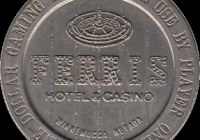|
Listen to this Gambling History blog post here
Getting your Trinity Audio player ready...
|

1934
After Nevada legalized gambling in 1931, a faction opposed to the industry fought to have it eradicated.
“A group of Nevada citizens felt there was a growing protest against the injury being done our state by gambling — not only because of the evil done in depriving needy citizens of their depressed earnings without compensation but because our state was being exploited politically and socially and its good name was being smirched by this evil,” reported the Nevada State Journal (July 4, 1934).
With a 24-to-6 vote, the 1933 legislature rejected a proposed anti-gambling law, thereby leaving a vote on the issue to the electorate. The antis generated a petition that, with valid signatures of 10 percent of the population, would get a referendum to repeal the gambling law on the November 1934 general election ballot. Whereas 2,952 names were needed, volunteers from around the state captured 3,027.
Revealing Results
Formal submission of the petition spurred a contingency of businessmen on the other side of the issue to take action, too. They were T.M. Carol, E.W. Craigen, Eugene Ward, Richard Rochl, Will Beckley, Arthur Brick and R.W. Thomas — of Las Vegas — and Ben Rotholtz, Ed O’Brien, J.N. Pedersen, A.C. Pedersen, and Frank Corsiglia — of Reno.
They claimed to represent all those who approved of gambling due to the revenue it generated for the state and argued that legally banning it simply would drive it underground.
They hired attorneys Lester D. Summerfield and Harlan Heward to represent them and investigate the petition’s validity.
Examination of the names revealed that 266 were fake, 47 were duplicates and 13 were illegible. In a number of instances, various signatures bore the same handwriting, and “Mr. and Mrs.” signatures were signed by only one of the two people. These illegitimate entries dropped the total below what was required.
Claiming fraud, Summerfield filed for an injunction in June to stop Nevada Secretary of State William Greathouse from submitting the proposed anti-gambling law to voters. The judge scheduled the trial for late July.
Conceding the Round
A few weeks later though, the anti-gambling faction announced it was standing down but would launch a new effort. It believed it was best to use its funds to circulate a new petition, one that would withstand scrutiny, rather than try to verify the challenged names.
“Opponents of gambling make it clear that they have not abandoned their fight and they express the utmost confidence that the people of Nevada would outlaw gambling if they were able to get the issue before them,” reported the Nevada State Journal (July 4, 1934).
Contrary to what they purported, the next legislative session came and went without the anti-gambling contingent circulating another petition. Today, more than 80 years later, those opposed to gambling in Nevada have failed to overturn the law.





